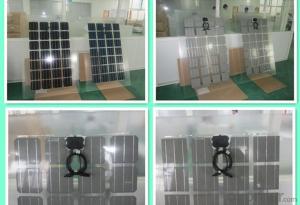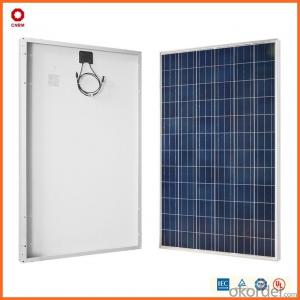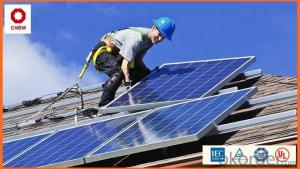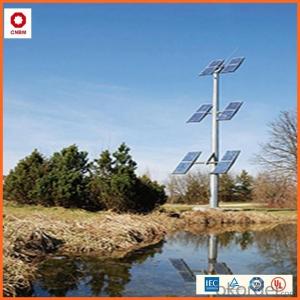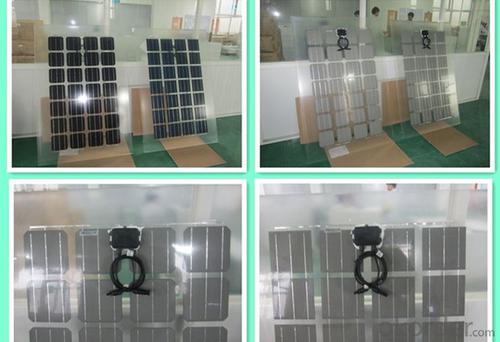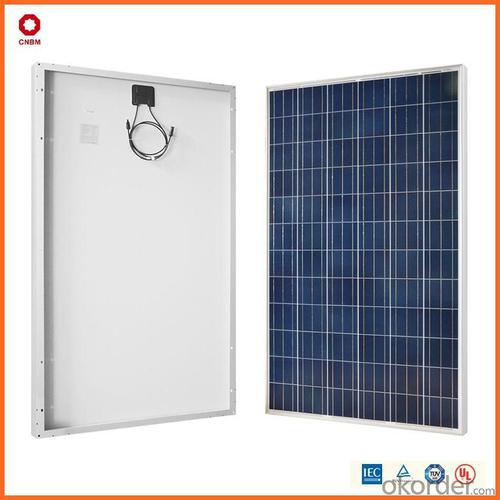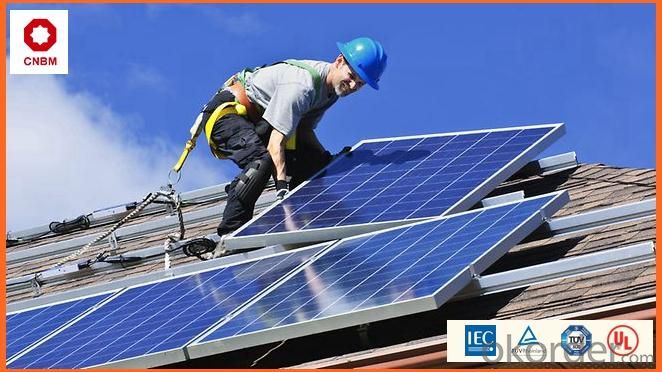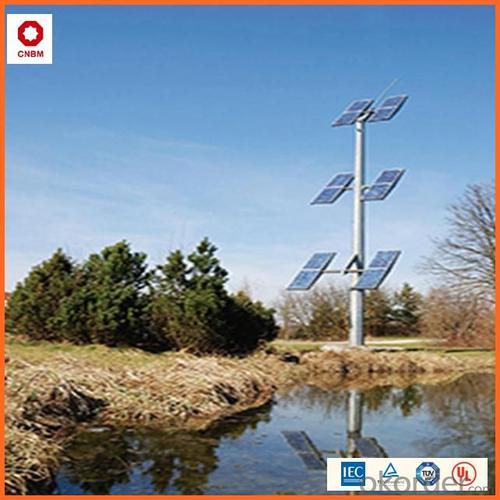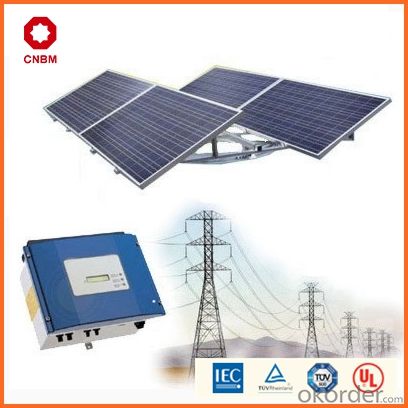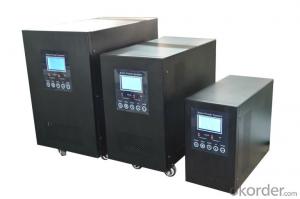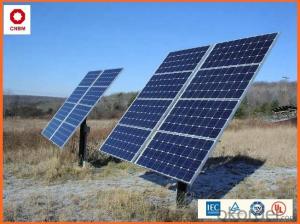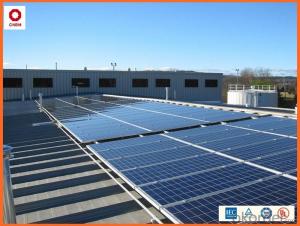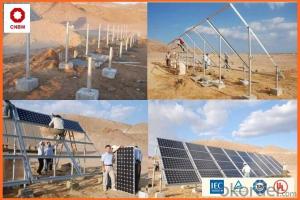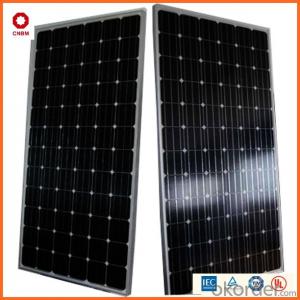60w Small Solar Panels for Solar Energy Systems Homes - In Stock China Manufacturer
- Loading Port:
- China main port
- Payment Terms:
- TT OR LC
- Min Order Qty:
- 1 watt
- Supply Capability:
- 10000000 watt/month
OKorder Service Pledge
OKorder Financial Service
You Might Also Like
Specification
Product Description:
Hot Sale !!! Quality and Safety of Small Poly Solar Panel 5w~150w
1. Rigorous quality control meets the highest international standards.
2. High-transmissivity low-iron tempered glass, strong aluminium frame.
3. Using UV-resistant silicon.
4. IS09001/14001/CE/TUV/UL
Warranties of Small Poly Solar Panel 35~85w
1. 10 years limited product warranty
2. 15 years at 90% of the minimal rated power output
3. 25 years at 80% of the minimal rated power output
Specification
Characteristics of Poly solar panels CNBM (245-320W) | |||||
Max Power Voltage Vmp(V) | 30.3 | 30.8 | 31.1 | 31.4 | 31.85 |
Max Power Current Imp(A) | 7.60 | 7.64 | 7.73 | 7.81 | 7.85 |
Open Circuit Voltage Voc(V) | 36.1 | 36.6 | 37 | 37.3 | 37.68 |
Short Circuit Current Isc(A) | 8.50 | 8.55 | 8.65 | 8.75 | 8.85 |
Max Power Pm(W) | 230W | 235W | 240W | 245W | 250W |
Temperature Coefficient of Cells Poly solar panels CNBM (245-320W) | |
NOCT | 45± 2 |
Temperature Coeffucients of Isc | 0.0492 |
Temperature Coeffucients of Voc | -0.3374 |
Temperature Coeffucients of Voc | -0.4677 |
Mechanical Data of Poly solar panels CNBM (245-320W) | |
Dimension | 1638 × 982 × 40 mm |
Weight | 19.5 kg |
No. of Cells and Connections | 60 (6 ×10) |
Tolerance | 0 ~ + 5 W |
Cell | Monocrystalline Cell 156 × 156 mm |
Packing | 624 Pcs/40ft(H) Container |
Limits of Poly solar panels CNBM (245-320W) | |
Operating Temperature | -40 to +85 |
Storage Temperature | -40 to +85 |
Max System Voltage | 1000VDC(IEC) / 600VDC(UL) |
Features of our products:
• High conversion efficiency mono/poly-crystalline amorphous silicon solar cells
• Modules incorporate high performance bypass diodes to minimize the power drop caused by shading
• High transmittance, low-iron tempered glass
• High performance EVA encapsulant to prevent destroying and water.
• AI frame: without screw, corner connection. 8 holes on the frame can be installed easily
• Good performance of preventing from atrocious weather such as wind and hails
• Certifications: CE IEC TUV VDE UL, Class I
• 10 years 90% power output warranty

Shipping of Small Poly Solar Panel 35~85w
By Sea | Delivery from Shanghai or Ningbo seaport |
By Air | Departure from Shanghai Pudong Airport |
By Express | Post by DHL, EMS, UPS, TNT. |
Features of our products:
• High conversion efficiency mono/poly-crystalline amorphous silicon solar cells
• Modules incorporate high performance bypass diodes to minimize the power drop caused by shading
• High transmittance, low-iron tempered glass
• High performance EVA encapsulant to prevent destroying and water.
• AI frame: without screw, corner connection. 8 holes on the frame can be installed easily
• Good performance of preventing from atrocious weather such as wind and hails
• Certifications: CE IEC TUV VDE UL, Class I
• 10 years 90% power output warranty
As a professional Solar Panel manufacturer and Supplier in China, we have our customers come around the whole world and our specialization has got a worldwide recognition. Meanwhile, with our superior quality, competitive price, prompt and excellent service, As main role in trade section of CNBM Group, CNBM International Corporation supplies products including Monocrystalline Solar Panel, Polycrystalline Solar Panel ( multicrystalline silicon Solar Panel) have received and enjoyed famous reputation in many countries and regions in the world.
- Q: Can solar energy systems be used in areas with limited space for ground-mounted installations?
- Yes, solar energy systems can be used in areas with limited space for ground-mounted installations. In such cases, alternative options like rooftop solar panels or solar canopies can be utilized to maximize the use of available space and still harness solar energy effectively.
- Q: Can solar energy systems be used for powering boats?
- Yes, solar energy systems can be used for powering boats. Solar panels can be installed on the boat's surface to capture sunlight and convert it into electricity. This renewable energy source can then power various onboard systems, including lighting, navigation equipment, and even propulsion systems. Solar-powered boats offer an environmentally friendly and sustainable alternative to traditional fossil fuel-powered watercraft.
- Q: Solar PV systems
- Article 1 in order to regulate the construction of distributed photovoltaic power generation project management, promote distributed photovoltaic applications, according to the "People's Republic of China renewable energy law", "People's Republic of China, People's Republic of China" power law "administrative licensing law", and the "State Council on a number of opinions" to promote the healthy development of the PV industry, these measures are formulated.
- Q: Can solar energy systems be used in areas with strict noise regulations?
- Yes, solar energy systems can be used in areas with strict noise regulations. Solar energy systems are typically silent as they do not have any moving parts, unlike traditional power generation systems such as generators. Therefore, they comply with noise regulations and can be installed and operated without causing any noise disturbances.
- Q: Can solar energy systems be used for emergency response operations?
- Yes, solar energy systems can be used for emergency response operations. Solar panels can generate electricity even during power outages, providing a reliable and sustainable source of energy to power critical equipment and facilities. Solar-powered generators can also be used to charge communication devices, run medical equipment, provide lighting, and support other emergency response activities in remote or disaster-stricken areas where access to traditional power sources may be limited or disrupted. Additionally, solar energy systems can help reduce dependence on fossil fuels and contribute to a more sustainable and resilient emergency response infrastructure.
- Q: Can solar energy systems be integrated into building materials?
- Yes, solar energy systems can be integrated into building materials. This is known as building-integrated photovoltaics (BIPV), where solar panels or cells are seamlessly incorporated into various elements of a building, such as roofs, windows, and facades. BIPV allows for the generation of electricity while serving functional and aesthetic purposes, making it a sustainable and innovative solution for harnessing solar energy.
- Q: Are there any risks of electrical hazards during installation or maintenance of solar energy systems?
- Yes, there are risks of electrical hazards during the installation or maintenance of solar energy systems. Solar energy systems involve working with high-voltage DC (direct current) electricity, which can pose dangers if not handled properly. Some of the potential risks include: 1. Electrocution: Solar panels generate electricity, and if not isolated or disconnected properly, there is a risk of electrocution for individuals working on the system. 2. Fire Hazards: Faulty wiring, loose connections, or improper installation can lead to electrical arcs and sparks, which can ignite a fire if proper precautions are not taken. 3. Falls and Injuries: Solar panels are typically installed on rooftops, which may involve climbing ladders, working at heights, and handling heavy equipment. If not done with caution, it can result in slips, falls, or injuries. 4. Arc Flash: When working on live electrical equipment, there is a risk of arc flash, which is a sudden release of energy that can cause severe burns, hearing damage, and even death. 5. Environmental Risks: While not directly related to electrical hazards, it is essential to consider potential environmental risks during the installation of solar energy systems. For instance, improper disposal of hazardous materials used in solar panels, such as lead, cadmium, or other toxic substances, can harm the environment if not handled correctly. To mitigate these risks, it is crucial to follow proper safety protocols and guidelines during the installation and maintenance of solar energy systems. This includes wearing personal protective equipment (PPE), ensuring proper grounding and isolation procedures, using insulated tools, and following all local electrical codes and regulations. It is also recommended to hire trained and certified professionals for the installation and maintenance to minimize the risks associated with electrical hazards.
- Q: Can solar energy systems be used in areas with limited roof access for maintenance?
- Yes, solar energy systems can be used in areas with limited roof access for maintenance. While it is more common to install solar panels on rooftops for optimal sun exposure, there are alternative options available. Ground-mounted solar panels can be installed in areas where roof access is limited, allowing for easier maintenance and cleaning. Additionally, solar panel systems can also be integrated into other structures such as carports or pergolas, providing an alternative to traditional rooftop installations. These alternatives ensure that solar energy systems can be utilized effectively in areas with limited roof access for maintenance.
- Q: Can solar energy systems be used for powering off-grid oil platforms?
- Yes, solar energy systems can certainly be used for powering off-grid oil platforms. By installing solar panels on the platforms, they can generate electricity to meet the power demands of various operations and equipment. This renewable energy source can reduce the reliance on traditional fossil fuel generators, lower operational costs, and reduce the environmental impact associated with oil drilling.
- Q: Can solar energy systems be used for powering remote weather stations?
- Yes, solar energy systems can be used for powering remote weather stations. Solar panels can be installed at these stations to capture sunlight and convert it into electricity, providing a sustainable and reliable power source for the station's operations. This eliminates the need for traditional electricity sources or frequent battery replacements, making solar energy an ideal solution for remote locations.
Send your message to us
60w Small Solar Panels for Solar Energy Systems Homes - In Stock China Manufacturer
- Loading Port:
- China main port
- Payment Terms:
- TT OR LC
- Min Order Qty:
- 1 watt
- Supply Capability:
- 10000000 watt/month
OKorder Service Pledge
OKorder Financial Service
Similar products
Hot products
Hot Searches
Related keywords
